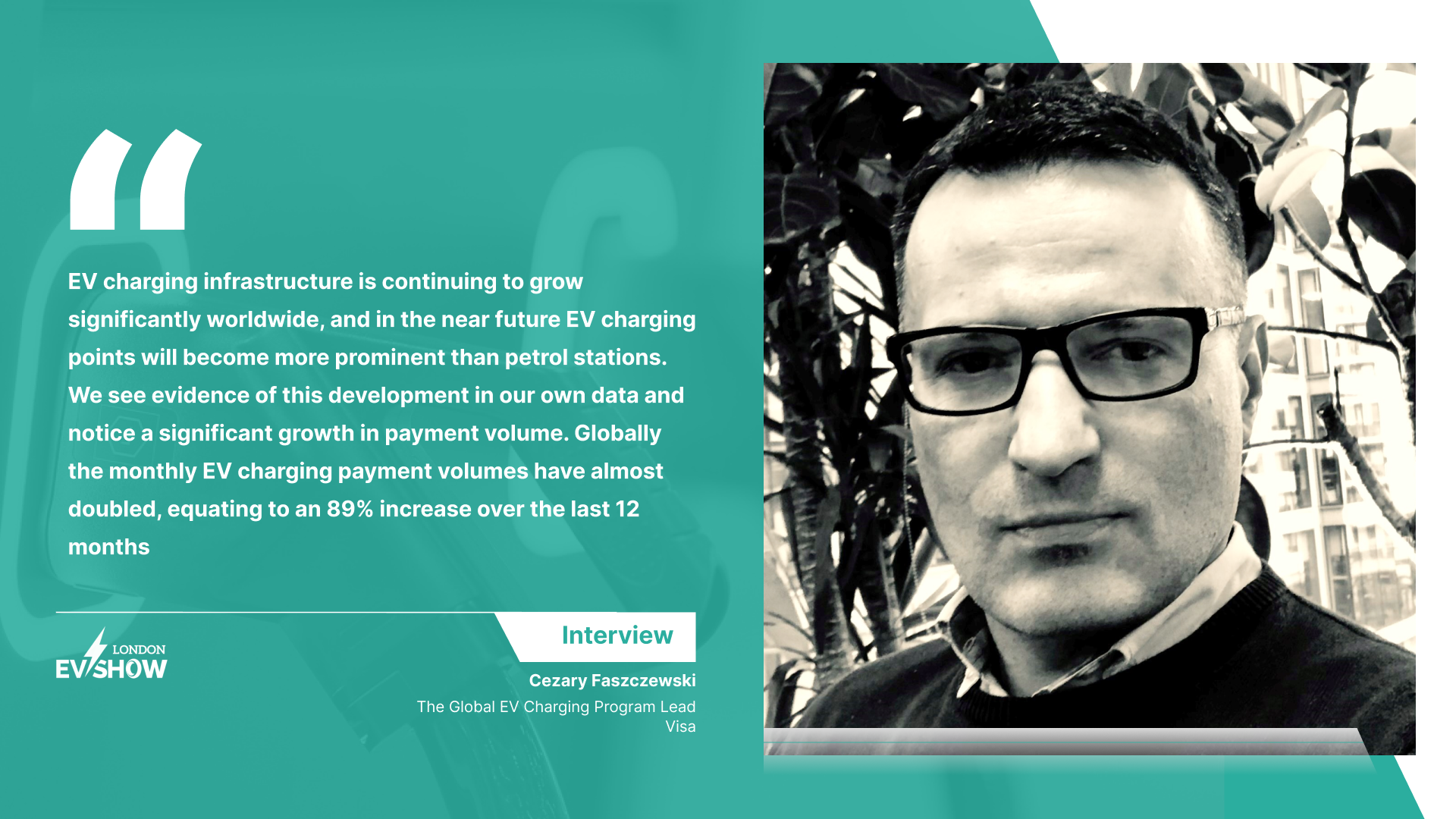In the ever-evolving landscape of digital payments, Visa stands tall as a global leader, connecting consumers, merchants, financial institutions, and governments across more than 200 countries and territories. Their commitment lies in uplifting everyone, everywhere, by facilitating seamless and secure transactions, embodying the best way to pay and be paid.
We had the privilege of engaging in a stimulating Q&A session with Cezary Faszczewski, the Global EV Charging Program Lead at Visa. Cezary brings a wealth of expertise in advancing the electric vehicle (EV) charging ecosystem, leveraging Visa's expansive network and innovative solutions to support the exponential growth of this dynamic market.
Let's delve into the conversation to glean insights from Cezary Faszczewski, a driving force behind Visa's transformative endeavours within the burgeoning realm of electric vehicles and digital payments.
#LEVS: Can you share your perspective on the growth trajectory of the EV market worldwide?
Cezary Faszczewski: The EV charging infrastructure is continuing to grow significantly worldwide, and in the near future EV charging points will become more prominent than petrol stations. We see evidence of this development in our own data and notice a significant growth in payment volume. Globally the monthly EV charging payment volumes have almost doubled, equating to an 89% increase over the last 12 months.
The share of electric vehicles is expanding – supported by local governments pushing for more sustainable means of transport. The global shift to electric vehicle use is happening at very different speeds depending on the individual market. For example, Norway is in the lead, where electric vehicles accounted for almost 80% of new passenger car registrations in 2022. EV sales in North America (US and Canada) increased by 48% year on year.
Looking at consumer preference in payments at EV charging stations, 67% of consumers want to pay using their debit or credit card, which is why we are working to enable complementary solutions, so the customers have a choice.
Think about an electric vehicle as a smartphone on wheels – everything will be operating more conveniently and intuitively, much like the ease of using your smartphone. Looking ahead, more payment processes and services could effortlessly fade into the background, and becoming invisible. Paying for EV charging should become more seamless and hassle free as consumers demand greater convenience and choice.
#LEVS: How is Visa working to support the global expansion of electric vehicle charging infrastructure, and are there any notable initiatives in this regard?
Cezary Faszczewski: Our aim is to create interoperable, secure and seamless EV payment experiences everywhere for everyone. This means driving convenient, secure and direct payment options such as contactless and other payment options. Whether it's slow or fast charging, EV owners should have the choice of Visa payment options. We want to support EV charging operators by consulting on different types of payment models and methods. We are also working with fleet operators providing them the right level of data to support the increase of EV fleets, given today commercial vehicles represent the majority of the electric vehicles on the road.
But we also look beyond just payments – loyalty products or co-brand opportunities are becoming increasingly important. With support of global Visa data, we can help our partners to understand their customer behaviours better and to get insights into how EV charging behaviours evolve. These insights can help develop better value propositions and enhance customer satisfaction.
#LEVS: How is Visa addressing the security and privacy concerns associated with digital payments within the electric vehicle market, and what measures are in place to safeguard EV owners' financial information?
Cezary Faszczewski: At Visa, security is our top priority. Payments at EV charging stations are as secure as any other Visa transaction, thanks to our advanced security services, investment and large-scale network. We keep fraud at historic lows, less than 0.1% of transactions , by pioneering the use of innovative technology such as AI in payments and leveraging data from billions of card accounts and trillions of transactions.
Respecting privacy is central to our purpose. At Visa, we have adopted policies and practices designed to embed accountability for data practices throughout the organization and enable responsible execution through the expertise of dedicated security, privacy and data professionals working around the world on these topics.
We believe that open payments solutions clearly demonstrate tested and secure protocols, and already provide compliance with industry security and data privacy standards.
#LEVS: Could you elaborate on Visa's involvement in promoting contactless payment options at EV charging stations and the potential benefits for consumers?
Cezary Faszczewski: We want to enable consumers to pay using their preferred and most convenient option. Excluding the U.S., over 75% of Visa face-to-face transactions are tapped, which shows clearly how customers want to pay. It’s also one of the most ubiquitous and most secure payment options. Our aim is to make paying for EV charging as easy as paying for a coffee or normal fuel.
#LEVS: What are Visa's specific expectations and goals for its participation in the London EV Show, and how does Visa envision contributing to and benefiting from this event within the context of the electric vehicle market and related payment solutions?
Cezary Faszczewski: We acknowledge that there is a necessity for further education regarding the payment industry’s role in the electric vehicle (EV) sector. We perceive the London EV Show as an ideal platform to engage with an informed, proactive and positive community that are all pulling in the same direction regarding the promotion of further adoption of EVs and the logistics around charging. The progression of the EV sector needs a concerted effort from numerous industry participants; no one can drive the transformation to a more environmentally conscious and more electrified future alone.


